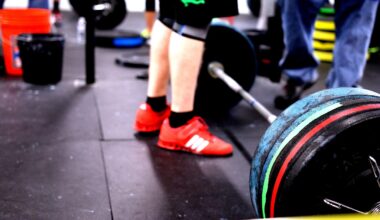Balancing Sodium Intake for Optimal Sports Nutrition
Balancing sodium intake is crucial for athletes striving to achieve optimal performance in their respective sports. Sodium plays an essential role in regulating fluid balance, nerve function, and muscle contraction. Inadequate sodium intake can lead to hyponatremia, characterized by low blood sodium levels resulting from excessive fluid accumulation in the body. This condition can adversely affect an athlete’s performance, causing fatigue, cramps, and even severe medical complications. To maintain proper sodium levels, athletes should aim to consume foods rich in sodium, especially during intense training sessions or competitions where they may lose significant amounts through sweat.
Understanding the sources of sodium is fundamental for individuals engaged in sports nutrition. Common sources include table salt, processed foods, and sports drinks designed to replenish electrolytes. Athletes should be cautious about their sodium consumption, especially if their training regimen involves endurance activities, where electrolyte loss occurs rapidly. The American College of Sports Medicine recommends athletes to consume sodium before engaging in prolonged exercise. This helps to maintain plasma sodium levels, enhancing sports performance. However, sodium intake should be balanced with adequate hydration to ensure optimal results.
Challenges with sodium intake arise from common misconceptions regarding dietary sodium. Many individuals mistakenly believe that reducing sodium is universally beneficial for health. While high sodium intake poses risks for the general population, athletes may require higher amounts due to their unique physiological demands. It is crucial for athletes to consult with nutritionists to determine their specific sodium requirements tailored to their sport and activity level. Proper education can help achieve a better understanding of the importance of sodium in a balanced diet aimed at enhancing athletic performance.
Methods to Monitor Sodium Levels
Monitoring sodium levels is essential for athletes seeking to optimize their performance. Regular tracking of dietary intake, sweat rates, and hydration status can help determine if sodium requirements are being met. Athletes can consider utilizing tools such as food diaries or mobile applications that calculate sodium intake from various foods consumed. Additionally, monitoring changes in body weight pre and post-exercise can indicate fluid and electrolyte losses experienced during workouts. Maintaining proper sodium levels is integral to supporting athletic performance during prolonged exercises such as running, cycling, or swimming.
Electrolyte drinks specifically formulated for athletes can effectively replenish lost sodium during and after intense training sessions. These drinks help maintain electrolyte balance, prevent cramping, and improve hydration. In addition to sodium, effective electrolyte drinks may contain potassium, magnesium, and calcium to further support athletic performance. Athletes should choose brands that clearly display sodium content on the label. Moreover, sodium-rich snack options like pretzels and salted nuts serve as excellent choices for quick recovery between training intervals.
Timeliness in sodium consumption is essential for maximizing athletic performance. Pre-exercise sodium loading can help athletes better retain fluids, supporting performance and endurance. Consuming electrolyte drinks containing sodium during prolonged events can also prevent dehydration and enhance performance. Post-exercise, athletes should immediately replenish lost electrolytes, including sodium, to expedite recovery and maintain balance. In this manner, a strategic approach to sodium intake can significantly improve training adaptations and competitive performance, maximizing overall athletic potential.
Consulting Health Professionals
Seeking guidance from health professionals is an excellent strategy for addressing sodium intake concerns. Sports dietitians can provide individualized recommendations based on an athlete’s specific needs, preferences, and training loads. Tailored advice can enhance sodium planning, optimizing hydration and electrolyte balance. Moreover, registered dietitians can help differentiate between athletic needs and general population guidelines. By emphasizing the importance of maintaining adequate sodium intake, athletes can better cater their nutrition strategies for improved efficiency and effectiveness in training and competition.
In summary, balancing sodium intake is a crucial aspect of sports nutrition that directly influences athletic performance. Athletes must prioritize optimal sodium levels to support their hydration, electrolyte balance, and overall well-being. Through continuous education and consultation with professionals, athletes can navigate the complexities of sodium consumption, allowing them to excel in their chosen sports. Emphasizing the significance of this mineral in a well-rounded nutrition strategy will greatly benefit athletes, ensuring they stay at the top of their game while safeguarding their health and performance.


